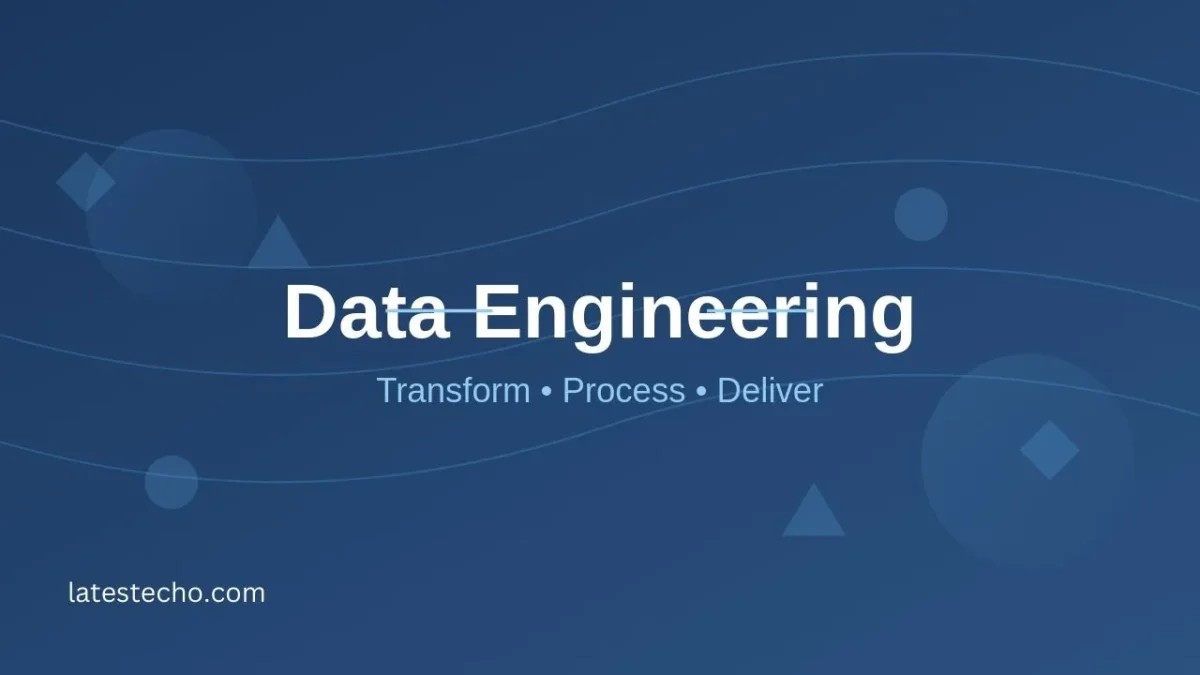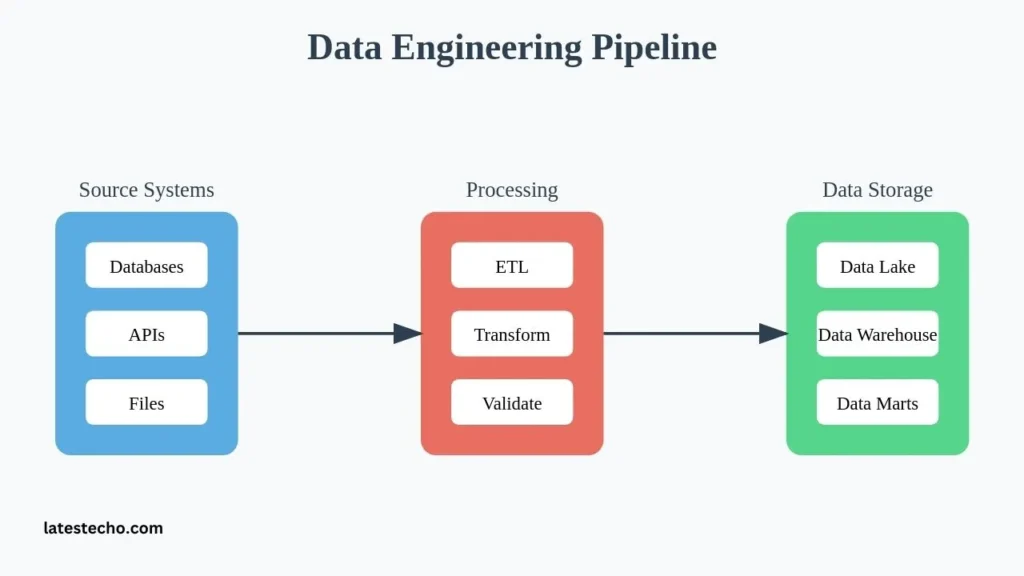
Data Engineering in 2025: Unlock Your Tech Potential
Let me tell you something fascinating – every single day, humanity generates an astounding 2.5 quintillion bytes of data! As someone who’s been working with data for over a decade, I’ve watched this field evolve from simple database management to a complex ecosystem of data pipelines and architectures. Data engineering has become the backbone of our data-driven world, and if you’re curious about this field, you’ve picked an exciting time to dive in. Whether you’re a complete beginner or a tech professional looking to pivot, understanding data engineering could be your ticket to one of the most in-demand careers in technology.
Highlights:
- Learn the foundational concepts of data engineering and its crucial role in modern businesses
- Explore the essential technical skills and tools required for data engineering careers
- Understand the career path and salary expectations in data engineering
- Get practical tips and resources for starting your data engineering journey
What is Data Engineering?
At its core, data engineering is the practice of designing and building systems for collecting, storing, and analyzing data at scale. Think of data engineers as the architects and builders of the digital highways that transport and transform data. They create the infrastructure that allows data scientists and analysts to do their magic with data.
The role involves developing data pipelines that can handle massive amounts of information efficiently and reliably. These pipelines take raw data from various sources, clean it up, transform it into useful formats, and make it readily available for analysis. It’s like being a master plumber for data – ensuring that information flows smoothly and reliably throughout an organization.
Essential Skills for Data Engineering
The path to becoming a data engineer requires a solid foundation in several technical areas. First and foremost, you’ll need strong programming skills, particularly in Python and SQL. Python is the swiss army knife of data engineering, used for everything from data processing to automation, while SQL remains the fundamental language for working with databases.
Database knowledge is another crucial component. You’ll need to understand both traditional relational databases like PostgreSQL and MySQL, as well as NoSQL databases like MongoDB and Cassandra. Each has its use cases, and knowing when to use which is a critical skill.
Big data technologies form another vital pillar of data engineering. Frameworks like Apache Spark, Hadoop, and Apache Airflow are commonly used to process and manage large-scale data operations. Understanding these tools and their ecosystems will give you a significant advantage in your career.
Getting Started with Data Engineering
The journey to becoming a data engineer doesn’t have to be overwhelming. Start with the basics – learn Python if you haven’t already. There are numerous free resources online, including Codecademy and Python.org’s official tutorials. Once you’re comfortable with Python, dive into SQL. These two languages will form the foundation of your data engineering toolkit.
Next, set up a local development environment and start working with databases. PostgreSQL is an excellent choice for beginners as it’s free, open-source, and has extensive documentation. Practice creating databases, writing queries, and understanding database design principles.
As you build confidence, start exploring big data technologies. Begin with Apache Spark, which has become an industry standard. The official Spark documentation and community resources can help you understand how to process data at scale.
Real-World Projects and Practice
Theory alone isn’t enough – you need practical experience. Start building small projects that solve real problems. You can start your data engineering journey with some of the ideas given here:
Create a data pipeline that collects data from a public API, transforms it, and stores it in a database. Build a system that monitors social media mentions of specific topics and stores the data for analysis. Develop an ETL (Extract, Transform, and Load) process that combines data from multiple sources into a single database for reporting. These projects will help you understand the challenges of working with real-world data and give you valuable experience to discuss in job interviews.

Career Paths and Growth Opportunities
The career path in data engineering is both rewarding and lucrative. Entry-level data engineers can expect to earn around $80,000-$100,000 annually, while experienced professionals often command salaries well over $150,000. The field offers multiple specialization paths, from focusing on big data architecture to cloud platforms like AWS, Google Cloud, or Azure.
Many successful data engineers start in related fields like software development or database administration. The key is to continuously learn and adapt as technologies evolve. Consider getting certifications in cloud platforms or specific technologies to enhance your credentials.
Best Practices and Common Pitfalls
As you progress in your data engineering journey, keep these best practices in mind:
Always design for scalability – your solutions should be able to handle growing data volumes. Implement proper error handling and monitoring in your data pipelines. Document your work thoroughly – future you (and your colleagues) will thank you. Stay updated with the latest tools and technologies in the field.
Avoid common pitfalls like over-engineering solutions or neglecting data quality checks. Remember that simple, reliable solutions are often better than complex, fragile ones.
You may also want to know about XRP, Blaize Launches AI Chip IPO, How to Spot Phishing Scams in 2025’s Digital World
Why Pursue a Career in Data Engineering?
The decision to pursue a career in data engineering couldn’t be more timely. According to the U.S. Bureau of Labor Statistics, the demand for data engineers is expected to grow by 21% through 2028, far outpacing the average for all occupations. But beyond the impressive growth statistics, there are compelling reasons to consider this career path.
First, data engineering offers exceptional job security. As businesses continue their digital transformation journeys, the need for professionals who can build and maintain data infrastructure becomes increasingly critical. Companies across all industries – from healthcare and finance to retail and entertainment – are investing heavily in their data capabilities.
The financial rewards are equally attractive. Entry-level data engineers often start with salaries ranging from $80,000 to $100,000, while experienced professionals can earn upwards of $150,000 to $200,000 annually. Companies like Google, Amazon, and Facebook are known to offer even higher compensation packages, including substantial stock options and bonuses.
Moreover, data engineering provides incredible intellectual stimulation. You’ll constantly work with cutting-edge technologies, solve complex problems, and create systems that can process millions of data points in seconds. It’s a field that rewards both technical expertise and creative problem-solving skills.
Learning Platforms and Resources for Data Engineering
Here’s a comprehensive list of platforms and resources to help you master data engineering, from basics to advanced concepts:
Online Course Platforms
- Coursera: Data Engineering Professional Certificate by IBM https://www.coursera.org/professional-certificates/ibm-data-engineer
- Udacity: Data Engineering Nanodegree https://www.udacity.com/course/data-engineer-nanodegree–nd027
- DataCamp: Data Engineer with Python Track https://www.datacamp.com/tracks/data-engineer-with-python
Free Learning Resources
- freeCodeCamp’s Data Engineering Course (YouTube) https://www.youtube.com/c/freecodecamp
- Apache Spark Official Documentation https://spark.apache.org/docs/latest/
- PostgreSQL Tutorial https://www.postgresqltutorial.com/
Advanced Specialization Platforms
- Cloud Certifications:
- AWS Data Analytics Specialty https://aws.amazon.com/certification/certified-data-analytics-specialty/
- Google Cloud Professional Data Engineer https://cloud.google.com/certification/data-engineer
- Azure Data Engineer Associate https://learn.microsoft.com/en-us/certifications/azure-data-engineer/
Community Resources
- GitHub: Awesome Data Engineering https://github.com/igorbarinov/awesome-data-engineering
- Medium’s Towards Data Science https://towardsdatascience.com/
- Reddit r/dataengineering https://www.reddit.com/r/dataengineering/
Conclusion
Data engineering is a challenging but incredibly rewarding field that plays a crucial role in our data-driven world. By starting with the fundamentals, building practical experience through projects, and continuously learning, you can build a successful career in this dynamic field. Remember that every expert was once a beginner, and the most important step is to start. Whether you’re building your first Python script or designing complex data architectures, focus on understanding the principles behind what you’re doing, and the rest will follow.
The field of data engineering continues to evolve, and that’s what makes it exciting. New tools and technologies emerge regularly, offering better ways to solve data challenges. Stay curious, keep learning, and don’t be afraid to experiment with different approaches. Your journey in data engineering starts now, and the possibilities are endless.
Frequently Asked Questions (FAQ)
1. How to get into data engineering with no experience?
Start by building a strong foundation in programming (Python) and databases (SQL). Create personal projects that demonstrate your abilities – for example, build a data pipeline that collects and processes data from public APIs. Contribute to open-source projects and build a portfolio on GitHub. Consider getting relevant certifications from cloud providers like AWS or Google Cloud. Network with data professionals through LinkedIn and local meetups.
2. What is required to be a data engineer?
Essential requirements include:
- Programming skills on Java, Scala or Python and many more.
- Expertise in SQL and database management
- Understanding of big data technologies (Hadoop, Spark)
- Knowledge of ETL tools and data warehousing
- Cloud platform experience (AWS, GCP, or Azure)
- Problem-solving and analytical thinking skills
- Version control systems (Git)
- Basic understanding of data security and governance
3. What should I learn first for data engineering?
Start with these fundamentals in order:
- Python programming
- SQL and database concepts
- ETL processes and data warehousing
- Big data technologies
- Cloud platforms
- Data modeling
- Version control with Git
- Apache Spark and Hadoop
4. How do I get my first data engineering job?
To land your first data engineering job:
- Build a strong portfolio of personal projects
- Get relevant certifications (AWS, Google Cloud, Azure)
- Network with professionals in the field
- Contribute to open-source projects
- Apply for internships or junior positions
- Prepare for technical interviews by practicing coding challenges
- Consider starting in related roles (Data Analyst, Software Engineer)
5. How to become a data engineer without a degree?
While a degree is helpful, it’s not mandatory. Focus on:
- Building practical skills through online courses and bootcamps
- Getting industry-recognized certifications
- Creating a strong portfolio of projects
- Contributing to open-source projects
- Building a professional network
- Acquired several freelances and an internships
- Demonstrating continuous learning and skill development
6. What is the entry & senior level data engineer salary?
Entry-level data engineers (0-2 years’ experience):
- Range: $70,000 – $100,000
- Average: $85,000
Senior-level data engineers (5+ years’ experience):
- Range: $120,000 – $200,000+
- Average: $150,000
- Additional compensation often includes stock options, bonuses, and benefits
- Salary varies by location, company size, and industry
Note: Salaries are typically higher in tech hubs like San Francisco, New York, and Seattle, and at major tech companies. Remote work opportunities have also increased, offering competitive salaries regardless of location.
